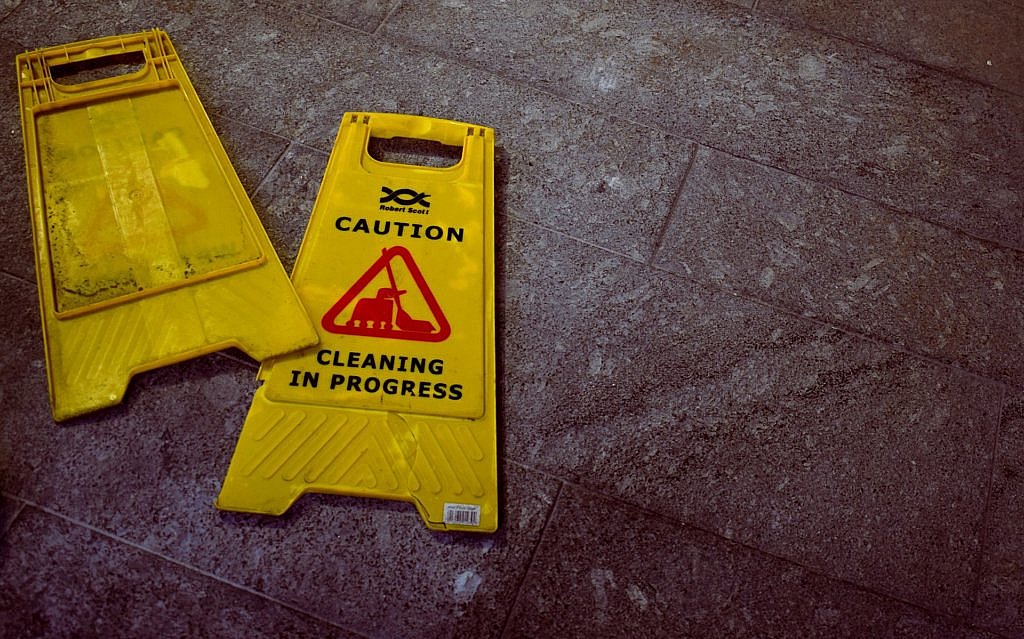
The media paints “slip and fall” cases as automatic payouts in Virginia. But the reality couldn’t be further from the truth. These types of cases are some of the most difficult in Virginia personal injury law. To illustrate this point, let’s consider the case of Jefferson v. Kroger.
The “slip & fall” facts of Jefferson v. Kroger.
On May 4, 2011, the Plaintiff walked into a Kroger when her foot caught “little groove” in the sidewalk. It was located right next to a metal plate at the base of the entrance doors. Testimony established the groove to be approximately half an inch deep and approximately a quarter-inch wide.
Plaintiff testified that she didn’t notice the groove before falling. And that she could not have seen the groove had she been looking for it.
In response, Kroger argued that it wasn’t aware of the groove. Based upon this, the Court dismissed the case.
Why did the Court Dismiss the Plaintiff’s Case?
The Court found that the groove was not a “dangerous condition.” Further, it opined that Kroger wasn’t aware of the groove before the Plaintiff fell. What’s more, the Court went on to state:
“Simply put, the Plaintiff’s own opinions and conclusions are no substitute for evidence of how and when the allegedly dangerous crevice developed. Plaintiff’s reliance on her own statements amounts to mere speculation and conclusion allegations.”
You Must Prove 4 Things in a Slip and Fall Case in Virginia:
You must have fallen due to a dangerous condition.
- Stated another way, establishments aren’t required to keep their property in perfect condition. Inherently, there will be flaws at any location.
To understand “dangerous conditions,” we look to prior Virginia cases. Dangerous conditions have been found when wet or slippery substances, or unexpected objects, were laying on the floor. But courts have found irregularities in sidewalks to NOT be dangerous conditions. In fact, one court found a concrete depression 3 inches long, 4 inches wide, and 1 inch deep did not constitute a dangerous condition!
The Store must have known or should have known of the dangerous condition.
- On top of that, you must prove that the store (or wherever you fell) knew or should have known of the dangerous condition. There are two ways this is defined:
- “Actual Knowledge”
Actual knowledge is exactly what it sounds like. It means that you must show that the store owner, manager, or some other agent actually knew that the condition was there. Statements like “I meant to clean that up,” or the like is what you’re looking for. - Should have known (“Constructive Knowledge”)
If no store representative will admit to knowing about the condition, you must prove the store should have known about it. This is very difficult. In the Jefferson case, the Plaintiff argued that it was apparent that there was a previous attempt to fix the groove. But she offered no evidence of that except her own testimony. That was not enough.
Proximate Cause – You must be able to articulate how you fell specifically.
- In addition, you must have specific knowledge about how you fell. Assuming how you fell or what you fell on will not be enough.
You must not have contributed to your fall – at all.
- Virginia imposes a law called contributory negligence. Under contributory negligence, if you are found to be even 1% at fault for the accident, you don’t recover. That means if you weren’t looking where you were walking, you were on your cell phone, or you were doing something else distracting, the defense will argue that you contributed to the accident by not being aware of your surrounding. While you may think that’s ridiculous, be fully aware that that is the law in Virginia.
What Should You Take Away from This Article?
To win your case, you must address the issues above. Personal injury litigation is costly and time-consuming. So before you decide you want to file your claim, you need to consult with an attorney and be able to answer YES to ALL of these questions.
You can also read more about the Jefferson v. Kroger Case here. Should you have any other questions, feel free to reach out to Abrenio Law for your FREE Consultation. Call us at 703.570.4180. You can also learn more about Owner James Abrenio here.
